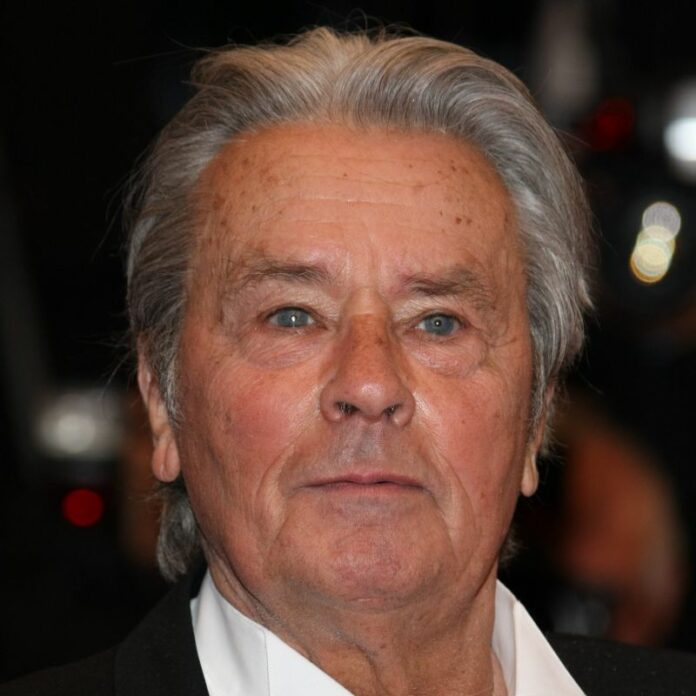The world of cinema is mourning the loss of French actor Alain Delon, who has passed away at the age of 88. His three children, Alain-Fabien, Anouchka, and Anthony, announced his death, stating that he “passed away peacefully at his home in Douchy, surrounded by his children and family.”
Delon was born on November 8, 1935, in Sceaux, Île-de-France. His early life was marked by hardship; at the age of four, his parents separated, leading to him being placed with a foster family and later sent to a series of boarding schools due to his unruly behavior. At 14, he returned home, left school, and began working in his stepfather’s delicatessen. However, this job was short-lived, and at 17, he enlisted in the French Navy, serving in Indochina, Southeast Asia.
In 1956, Delon returned to France, where he took on various odd jobs in Paris to make ends meet. His life took a turn when he met actress Brigitte Auber, who introduced him to the world of cinema. Director Yves Allégret offered him his first small role in the film “Godot,” and the following year, Marc Allégret cast him in “Be Beautiful But Shut Up.” Despite having no formal acting experience, Delon quickly made a name for himself, landing his first leading role in Pierre Gaspard-Huit’s “The Pure Lover,” where he met Romy Schneider, who would become his long-term partner. The two, young, beautiful, and successful, became known as the golden couple of cinema.
In 1959, Delon played one of the first of the handsome yet troubled characters that would define his career in René Clément’s thriller “Purple Noon.” The following year marked another milestone with his collaboration with Luchino Visconti, who cast him as the lead in “Rocco and His Brothers,” bringing Delon international fame. He continued to rise in prominence with films like “Joy of Living” by Clément and Michelangelo Antonioni’s “L’Eclisse,” before reuniting with Visconti for “The Leopard,” where he captivated audiences as Prince Tancredi.
Returning to France, Delon starred alongside his idol Jean Gabin in “Any Number Can Win,” even offering to work for free to share the screen with Gabin, despite objections from MGM producers. Around this time, Delon ended his relationship with Schneider and married actress Francine Canovas, later known as Nathalie Delon, with whom he had his second son, Anthony. His first son, Christian Aaron Boulogne, was born from a brief relationship with singer Nico and was later adopted by his mother.
Delon’s cinematic journey continued with notable films such as “The Black Tulip,” “Joy House,” “Spirits of the Dead,” and “Is Paris Burning?” His true breakthrough in France came in 1967 when Jean-Pierre Melville cast him as the lead in “Le Samouraï,” solidifying his status as a leading figure in the “polar” genre, the French equivalent of the Italian crime film. He starred in several iconic films of the genre, including “The Sicilian Clan” with Gabin. Delon also appeared in films of other genres, such as “Farewell, Friend” with his companion Mireille Darc, and “La Piscine,” where he starred alongside his former partner Romy Schneider.
In 1970, Delon produced and starred in “Borsalino” with Jean-Paul Belmondo, which became a box office hit. He continued his successful career with films like “The Red Circle,” “Red Sun” with Charles Bronson, and “The Professor” by Valerio Zurlini. In 1973, he recorded the song “Paroles, paroles” with Dalida, the French version of the Italian hit by Mina and Alberto Lupo. From the mid-1970s, Delon focused primarily on violent crime films and international productions of lesser significance, with a few exceptions like “Borsalino & Co” and “Zorro.”
In the 1980s, Delon gained attention for his role in “Spy in the Eye,” one of the highest-grossing films in Soviet cinema, and for his directorial debut with “For a Cop’s Hide,” which he also wrote, produced, and starred in alongside Anne Parillaud. He continued to work in notable films like “Swann in Love,” based on Marcel Proust’s work, and “Notre histoire,” for which he won his only César Award for Best Actor. However, his career began to decline in the following years, with fewer significant roles, such as “The Return of Casanova” and “New Wave” by Jean-Luc Godard.
In 1995, Delon received a Lifetime Achievement Award at the Berlin International Film Festival. Although he announced his retirement in 1997, he continued to work in theater and television, portraying Fabio Montale in the early 2000s. He had two more children, Anouchka and Alain-Fabien, with Dutch model Rosalie van Breemen. In 2005, following a breakup with van Breemen, Delon publicly revealed his struggle with depression, which had brought him close to suicide. That same year, French President Jacques Chirac awarded him the Legion of Honour for his contributions to global cinema.
Contrary to his earlier announcement, Delon returned to the screen in 2008, playing Julius Caesar in “Asterix at the Olympic Games.” He continued to perform in theater and received numerous lifetime achievement awards, including an honorary Palme d’Or at the Cannes Film Festival on May 19, 2019. A month later, Delon suffered a stroke followed by a cerebral hemorrhage, and later battled lymphoma. Today, we say goodbye to a cinema legend.

